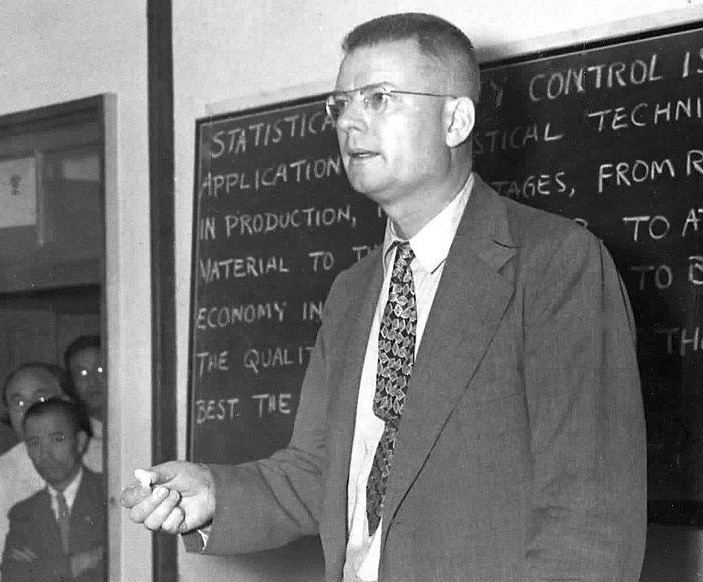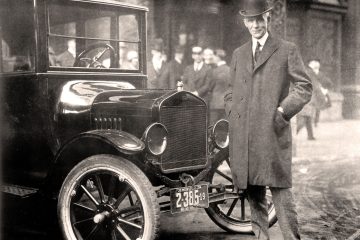 Bio and History of W. Edwards Deming, American Economist, Industrial Engineer & Management Consultant
Bio and History of W. Edwards Deming, American Economist, Industrial Engineer & Management Consultant
Full Name: William Edwards Deming
Vitals: October 14, 1900 – December 20, 1993 (Sioux City, Iowa)
Known for: Significant contributions to the field of total quality management (TQM) and his profound impact on the auto industry after World War II.
Education: University of Wyoming (BS), University of Colorado (MS), Yale University (PhD)
How Started: Educated initially as an electrical engineer and later specializing in mathematical physics, Deming helped develop the sampling techniques still used by the United States Census Bureau and the Bureau of Labor Statistics. He became the father of the quality movement and was hugely influential in post-WWII Japan, credited with revolutionizing Japan’s auto industry, which brought competition to American auto manufactures. He is best known for his theories of management.
……
Summary Bio
W. Edwards Deming was a pioneering figure in the fields of statistics, quality management, and organizational theory, whose work had a profound impact on industries worldwide, particularly in automotive manufacturing. His principles of Total Quality Management (TQM) have reshaped the approach toward quality and operational excellence.
Early Life and Education
Born on October 14, 1900, in Sioux City, Iowa, Deming faced a challenging upbringing that instilled in him the values of hard work and diligence. He pursued his education at the University of Wyoming, obtaining a B.S. in electrical engineering in 1921. He further earned an M.S. from the University of Colorado in 1925 and a Ph.D. in physics from Yale University in 1928.
Career and Contributions
After his education, Deming worked at the U.S. Department of Agriculture and the Census Bureau, where he developed a keen interest in statistical methods. His early work involved applying statistical methods to various fields, including agriculture and census data. During World War II, he was involved in quality and productivity improvement efforts for the U.S. military, which laid the groundwork for his later contributions to quality management.
Impact on Japan’s Industrial Revival
Deming’s most significant work came after World War II when he was invited to Japan by the Japanese Union of Scientists and Engineers (JUSE). He conducted seminars on statistical quality control and his philosophy of management, emphasizing the importance of quality, productivity, and competitive positioning. His teachings were crucial in transforming Japan into a global leader in high-quality manufacturing, and he is credited with playing a key role in Japan’s post-war economic miracle.
Introduction of TQM and the PDCA Cycle
Deming introduced the concept of Total Quality Management (TQM), an approach that focuses on long-term success through customer satisfaction and involves all members of an organization in improving processes, products, services, and culture. He also popularized the Plan-Do-Check-Act (PDCA) Cycle, a method for achieving continuous improvement in the quality of products and services.
Work in the U.S. Automotive Industry
In the 1980s, as American automotive manufacturers faced stiff competition from Japanese companies, Deming’s philosophies began to gain traction in the United States. His principles, which emphasized improving quality, reducing costs, and increasing productivity, were seen as a solution to the quality issues plaguing the American auto industry. Deming consulted with several major U.S. automotive manufacturers, helping them implement quality improvement programs that focused on statistical quality control, employee involvement, and a systemic approach to problem-solving.
Legacy and Influence
Deming’s influence extends beyond Japan and the automotive industry. His “14 Points for Management” and the “System of Profound Knowledge” provide a comprehensive framework for organizational excellence and have been applied in various sectors, including healthcare, education, and government.
Deming’s legacy is also preserved through the Deming Prize, one of the highest awards for TQM in the world, and the work of the Deming Institute, which continues to promote his teachings. His books, such as “Out of the Crisis” and “The New Economics,” remain essential readings for anyone interested in quality management and organizational performance.
W. Edwards Deming passed away on December 20, 1993, but his impact on quality management and his contributions to the field of statistics and organizational development continue to be felt globally. His work has inspired countless organizations to adopt a culture of continuous improvement and to view quality as a key driver of competitive advantage.
MORE:
Detailed Biography of W. Edwards Deming »
History and What is Total Quality Management »
Main Image Source: Social Media – Facebook
Content sources: Original | Generative AI | Wikipedia


